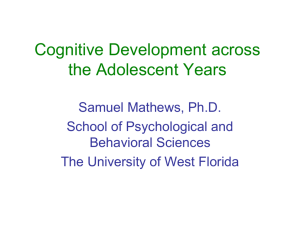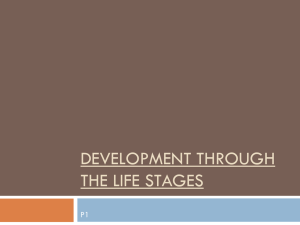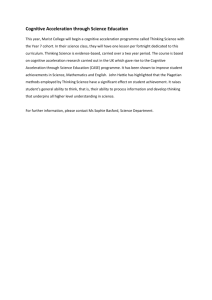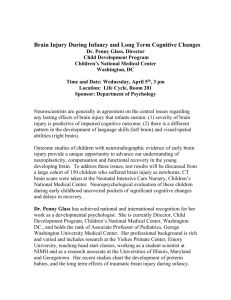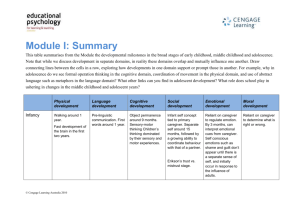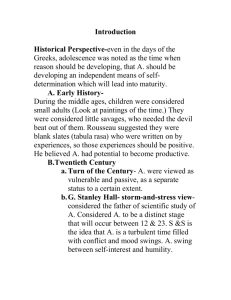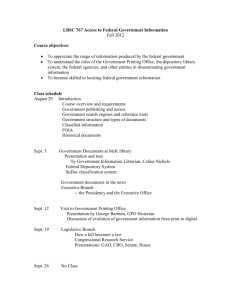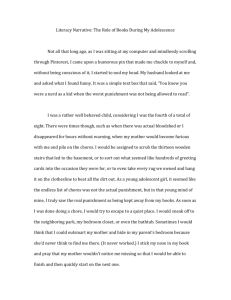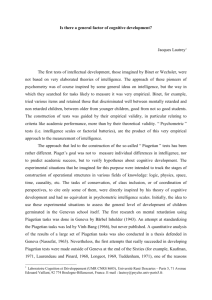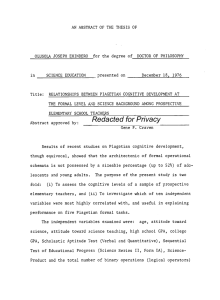P515/516 Syllabus - Indiana University Northwest
advertisement
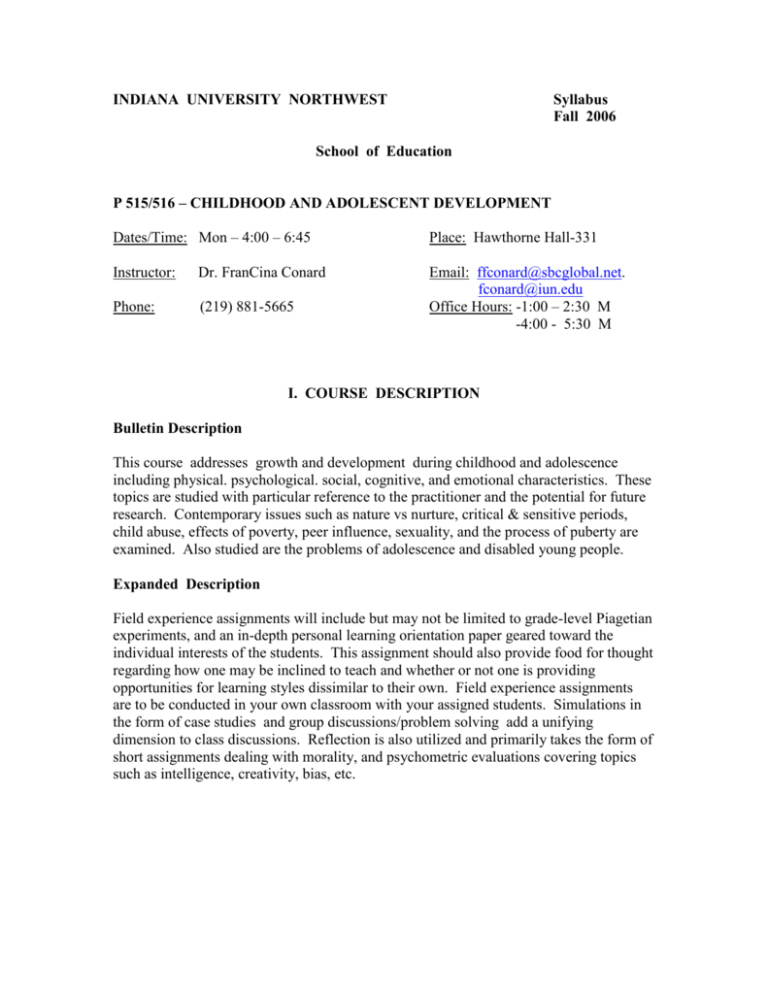
INDIANA UNIVERSITY NORTHWEST Syllabus Fall 2006 School of Education P 515/516 – CHILDHOOD AND ADOLESCENT DEVELOPMENT Dates/Time: Mon – 4:00 – 6:45 Place: Hawthorne Hall-331 Instructor: Dr. FranCina Conard Phone: (219) 881-5665 Email: ffconard@sbcglobal.net. fconard@iun.edu Office Hours: -1:00 – 2:30 M -4:00 - 5:30 M I. COURSE DESCRIPTION Bulletin Description This course addresses growth and development during childhood and adolescence including physical. psychological. social, cognitive, and emotional characteristics. These topics are studied with particular reference to the practitioner and the potential for future research. Contemporary issues such as nature vs nurture, critical & sensitive periods, child abuse, effects of poverty, peer influence, sexuality, and the process of puberty are examined. Also studied are the problems of adolescence and disabled young people. Expanded Description Field experience assignments will include but may not be limited to grade-level Piagetian experiments, and an in-depth personal learning orientation paper geared toward the individual interests of the students. This assignment should also provide food for thought regarding how one may be inclined to teach and whether or not one is providing opportunities for learning styles dissimilar to their own. Field experience assignments are to be conducted in your own classroom with your assigned students. Simulations in the form of case studies and group discussions/problem solving add a unifying dimension to class discussions. Reflection is also utilized and primarily takes the form of short assignments dealing with morality, and psychometric evaluations covering topics such as intelligence, creativity, bias, etc. II. SCHOOL OF EDUCATION MODEL This educational psychology course is part of the IUN School of Education’s Masters Program. This program is based upon a research-based conceptual framework that incorporates seven program outcomes that are designed to prepare a “Professional Leader.” A complete presentation of these outcomes is found in your portfolio handbook. The seven program outcomes of the Master Teacher Model are identified below along with an identification of the Objectives of this course that relate to each. Conceptual Framework Outcomes 1. Learning & Development 2. Knowledge & Instruction 3. Classroom Management & Assessment 4. Reflection 5. Collaboration & Professional Development 6. Educational Inquiry 7. Formal Inquiry Course Objectives B,C A,B.C.D A,D A,B,C C B A,B,C III. COURSE OBJECTIVES The general objective of this course is to provide textual and simulated learning experiences designed to enable the learner to recognize the various attributes contributing to personhood, and the sequential processes inherent in each individual’s somatic, mental and emotional growth and development from birth through the secondary years as they relate to education. This particular course emphasizes outcomes 1, 4, & 6 above. Specific instructional objectives that will aid in accomplishing this outcome are that the master teacher will delve further into the nature of teaching and learning by: A. Engaging in actual procedures to ascertain “special student” status. B. Researching behavioral/humanistic/cognitive theorists for differences or similarities, and producing a “personal orientation” research paper indicating the student’s interest in a specific area of child/adolescent development and learning. C. Utilizing Jean Piaget’s clinical methods by conducting experiments in the student’s own classroom. The specific level of the experiment is to be ascertained by the purported Piagetian stage the child is in. D. Being tested over class presentations and textual material (physical, emotional, and moral development, communication, norms, leadership and attraction.) IV. MATERIALS Required text: Martin, C.L. & Fabes, F. (2006). Discovering Child Development. Pearson, Allyn and Bacon. Boston, Mass. 2 V. ASSIGNMENTS AND ACTIVITIES Classes will consist of lectures, presentations, discussions, cooperative learning activities and debate forums (Pro and Con). It will require “in and out of class” participation, and seminar-type discussions (case-studies and Piagetian experiment), research paper presentation, and three (3) unit tests ( multiple-choice). The Piagetian Experiment assignment is an opportunity to engage in a clinical study using examples of Piaget’s experiments that are appropriate for the age/grade level in the graduate student’s classroom. This experience provides an opportunity for the student to verify or disallow opinions regarding capabilities of their students utilizing “tried and true” procedures not requiring psychometric expertise.The conclusion drawn from this experiment will be presented to the class and written up on a form provided by the instructor. The research paper should cover a topic concerning Child /Adolescent Development that is of interest to the student. It must be a minimum of five (5) pages with a minimum of six (6) references. All students are to have their topics approved before proceeding. The student will present this paper to the class. The paper should be written in APA style. VI . GRADING/EVALUATION Attendance and Participation Piagetian Experiments Research Paper 3 unit tests @30 pts. each TOTAL POSSIBLE POINTS 15 35 60 90 200 GRADING SCALE 200 189 179 169 159 149 139 129 Below 190 180 170 160 150 140 130 120 120 = = = = = = = = = A AB BC CD DF 3 VI. SCHEDULE Aug 28 Introduction, book check, Syllabus - Chapters 1 & 2 Sept 4 Prenatal Development and Birth - Chapter 4 Sept 11 Physical Development & Health in Infancy - Chapter 5 Sept 18 Cognitive & Language Development in Infancy - Chapter 6 Sept 25 TEST I Oct 2 Social & Emotional Development in Infancy - Chapter 7 Piagetian Project Presentations – Elementary Oct 9 Physical Development & Health in Early Childhood – Chapter 8 Piagetian Project Presentations - Secondary Oct 16 Cognitive & Language Development in Childhood - Chapter 9 Oct 23 Physical Development & Health in Late Childhood – Chapter - 11 Oct 30 TEST II Nov 6 Cognitive & Language Dev. in Late Childhood Nov 13 Physical Development & Health in Adolescence - Chapter 14 Nov 20 PAPER PRESENTATIONS Nov 27 Cognitive Development in Adolescence Dec 4 Social & emotional Development in Adolescence - Chapter 16 Dec 11 TEST III - Chapter 12 - Chapter 15 4
